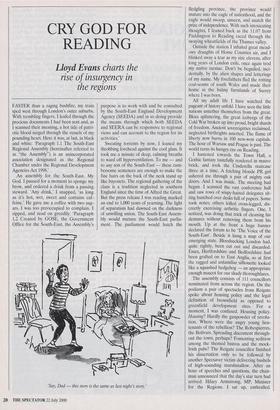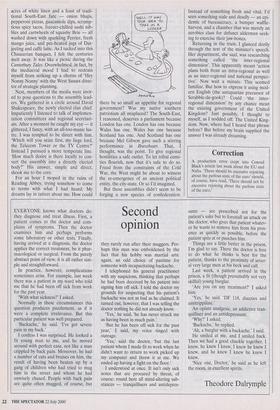CRY GOD FOR READING
Lloyd Evans charts the
rise of insurgency in the regions
FASTER than a raging bushfire, my train sped west through London's outer suburbs. With trembling fingers, I leafed through the precious documents I had been sent and, as I scanned their meaning, a hot tide of patri- otic blood surged through the vessels of my pounding heart. Here it was, at last, in black and white: 'Paragraph 1.1 The South-Fast Regional Assembly (hereinafter referred to as "the Assembly") is an unincorporated association designated as the Regional Chamber under the Regional Development Agencies Act 1998.'
An assembly for the South-East. My God. I paused for a moment to sponge my brow, and ordered a drink from a passing steward. 'Any drink,' I snapped, 'as long as it's hot, wet, sweet and contains caf- feine.' He gave me a coffee with two sug- ars. I was too preoccupied to complain. I sipped, and read on greedily: 'Paragraph 1.2 Created by GOSE, the Government Office for the South-East, the Assembly's purpose is to work with and be consulted by the South-East England Development Agency (SEEDA) and in so doing provide the means through which both SEEDA and SEERA can be responsive to regional views and can account to the region for its activities.'
Sweating torrents by now, I leaned my throbbing forehead against the cool glass. It took me a minute of deep, calming breaths to ward off hyperventilation. To me — and to any son of the South-East — these cum- bersome sentences are enough to make the fine hairs on the hack of the neck stand up like bayonets. The regional gathering of the clans is a tradition neglected in southern England since the time of Alfred the Great. But the press release I was reading marked an end to 1,000 years of yearning. The light of separatism had dawned on the darkness of unwilling union. The South-East Assem- bly would nurture the South-Fast parlia- ment. The parliament would hatch the `Say, Dad — this story is the same as last night's story.' fledgling province, the province would mature into the eagle of nationhood, and the eagle would swoop, unseen, and snatch the prize of independence. With such intoxicating thoughts, I leaned back as the 11.07 from Paddington to Reading raced through the swaying wheatfields of the Thames valley.
Outside the station I inhaled great mead- owy draughts of Home Counties air, and I blinked away a tear as my size elevens, after long years of London exile, once again trod my native tarmac. Don't be beguiled, inci- dentally, by the alien shapes and letterings of my name. My forefathers fled the rotting coal-seams of south Wales and made their home in the balmy farmlands of Surrey where I was born.
All my adult life I have watched the pageant of history unfold. I have seen the little nations untether themselves from the great. Blocs splintering, the great icebergs of the Cold War broken up into proud, bright shards of freedom. Ancient sovereignties reclaimed, neglected birthrights asserted. The flame of liberty now burns in 100 new-won capitals. The hour of Warsaw and Prague is past. The world turns its hungry eye on Reading. I hastened towards the Town Hall, a Gothic fantasy tastefully rendered in mauve brick, and took the Cinderella staircase three at a time. A fetching blonde PR girl ushered me through a pair of mighty oak doors. And I was inside. The meeting had begun. I scanned the vast conference hall and saw rows of wispy-haired delegates sit- ting hunched over desks full of papers. Some took notes; others lolled cross-legged, dis- creetly exercising arthritic fingers. One, I noticed, was doing that trick of cleaning his dentures without removing them from his mouth. Up at the front a huge banner declared the forum to be 'The Voice of the South-East'. Beside it hung a map of our emerging state. Bloodsucking London had, quite rightly, been cut out and discarded. Essex, Hertfordshire and Bedfordshire had been grafted on to East Anglia, so at first the ragged and unfamiliar silhouette looked like a squashed hedgehog — an appropriate enough mascot for our shady thoroughfares.
The assembly consists of 111 councillors nominated from across the region. On the podium a pair of spectacles from Reigate spoke about housing policy and the legal definition of brownfield as opposed to greenfield development sites. For a moment, I was confused. Housing policy. Housing? Hardly the gunpowder of revolu- tion. Where were the angry young lieu- tenants of the rebellion? The Robespierres, the Bolivars. Spreading discontent through- out the town, perhaps? Fomenting sedition among the themed bistros and the mock- Irish pubs? The Reigate councillor finished his dissertation only to be followed by another Specsaver victim delivering bushels of high-sounding marshmallow. After an hour of speeches and questions, the chair- man announced that the day's star turn had arrived: Hilary Armstrong, MP, Minister for the Regions. I sat up, enthralled.
Cometh the hour, cometh the trousersuit.
With her sandy bob and wonky teeth, this unassuming Geordie travels the country prescribing freedom to the provinces of what was once England. As she walked up the aisle — our liberator! our champion! I was surprised that there was no press of delegates surging forward to strew her path with rose petals or garland her Littlewoods stretch-flannel tunic with honeysuckle and white lilies. Perhaps everyone was, like me, too overwhelmed by the occasion. The clap- ping subsided. Silence fell. My ears strained to hear the first words of England's Gor- bachev. 'The regional agenda is important,' she began, 'because it is important for you to address issues that are important to your region.' I blinked a couple of times and laid aside my pen. She continued: 'We encour- aged the formation of regional chambers to provide a coherent voice within each region to develop the capacity for further action at the regional level, and to make it easier for each Regional Development Agency to get a regional view on its activities.'
Discreetly plugging my ears with my Network South-East paper napkin, I scanned the rest of the day's agenda. 1) Extending the assembly's influence with Brussels. 2) Establishing a liaison execu- tive with the Greater London Authority. 3) Discussing the Sustainable Development Framework.
But where was the burning question? The glorious day! The march on the capi- tal! The region already encircles London. We control their water supply at Slough. Their road and rail links pass through our sovereign territory. Their foul, polluting airports lie exposed on our once-fertile meadows. With a bridgehead thrown across the Thames at Gravesend we could throttle them into submission within a week. Isn't that what regional government is all about? Before I could raise this issue, the minister had wound up her speech and was taking questions from the floor. Some were so impenetrably phrased that I almost felt I was hearing a new dialect.
`Before SEERA's next AGM, will the minister advise the regional NHS commit- tee to initiate dialogue between the RDA and NHS Executive Forum of the GLA?' Part English, part Scrabble-de-gook. The minister tossed out answers as bland as uncooked doughnuts, then slipped away. Meanwhile, to my great relief, a lunch-break was announced. Hungry work, starting a new country from scratch. We swarmed into an antechamber where rows of tables awaited us spread with kissable
acres of white linen and a feast of tradi- tional South-East fare — onion bhajis, pepperoni pizzas, guacamole dips, scrump- tious spicy tacos, freezer-chilled sushi nib- bles and cartwheels of squashy Brie — all washed down with sparkling Perrier, fresh mango juice, and pre-heated jugs of Dar- jeeling and caffe latte. As I tucked into this Chaucerian banquet, I felt the centuries melt away. It was like a picnic during the Canterbury Tales. Overwhelmed, in fact, by the mediaeval mood I had to restrain myself from striking up a chorus of 'Hey Nonny Nonny' with the West Sussex direc- tor of strategic planning.
Next, members of the media were invit- ed to pose questions to the assembly lead- ers. We gathered in a circle around David Shakespeare, the newly elected clan chief. Impatiently I listened to talk of implemen- tation committees and regional secretari- ats. After a moment he caught my eye — it glittered, I fancy, with an all-too-manic lus- tre. I was tempted to be direct with him. `Which will you seize first, my liege lord, the Telecom Tower or the TV Centre?' Instead I pursued a more temperate line. `How much desire is there locally to con- vert the assembly into a directly elected body?' His answer, simple and direct, shook me to the core.
For an hour I moped in the ruins of Reading Abbey, trying somehow to come to terms with what I had heard. My dreams lay in tatters about me. How could
there be so small an appetite for regional government? Was my native southern patriotism all misplaced? The South-East, I reasoned, deserves a parliament because London has one. London has one because Wales has one. Wales has one because Scotland has one. And Scotland has one because Mel Gibson gave such a stirring performance in Braveheart. That, I thought, was the point. To give regional hostilities a safe outlet. To let tribal enmi- ties flourish, now that it's safe to do so. Freed from the constraints of the Cold War, the West might be about to witness the re-emergence of an ancient political entity, the city-state. Or so I'd imagined.
But these assemblies didn't seem to be forging a new species of confederation.
Instead of something fresh and vital, I'd seen something stale and deadly — an epi- demic of bureaucracy, a bumper waffle- harvest, and a chamber that was merely an aerobics class for defunct aldermen seek- ing to exercise their jaw-bones.
Returning in the train, I glanced dozily through the text of the minister's speech. Her department, she said, was researching something called 'the inter-regional dimension'. This apparently meant 'action plans both from an intra-regional as well as an inter-regional and national perspec- tive'. Now wait a minute. This seemed familiar. But how to express it using mod- ern English (the antiquarian precursor of Scrabble-de-gook)? Could 'the inter- regional dimension' by any chance mean the existing government of the United Kingdom? Just possibly, I thought to myself, as I nodded off. The United King- dom. Now, where had I heard that phrase before? But before my brain supplied the answer I was already dreaming.




























































 Previous page
Previous page